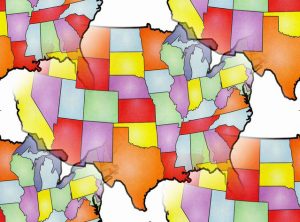Could Veterinarians Recommend Pot for Pets?
We all know the importance of keeping Sparky away from the pot brownies. But is it possible your pet could receive medical marijuana as a recommended treatment from their vet?
treatment from their vet?
A vast majority of rational Americans agree that the use of marijuana as a treatment for medical purposes is a decision that should be made between and doctor and patient. Recent polls show more than 90 percent of respondents favor medical marijuana with a doctor’s recommendation. And California has long been a defender of patient rights by leading the nation in medical marijuana legalization with the Compassionate Use Act of 1996.
So why should the decision be any different when it comes to animals and veterinary professionals?
As it stands, California law does not extend to veterinarians the ability to recommend marijuana as a treatment for animals. But AB-2215, introduced by Assemblymember Ash Kalra (D-27), is looking to change that. The bill would put the power in the hands of the Veterinary Medical Board by calling on them to set the standards for state-licensed veterinarians to discuss marijuana treatment for animal patient clients, and it would also prevent veterinarians from being punished for having such discussions.
 Cannabis Law Group's Medical Marijuana Legal Blog
Cannabis Law Group's Medical Marijuana Legal Blog





 number of marijuana businesses, University of California San Francisco says the answer is right under our noses.
number of marijuana businesses, University of California San Francisco says the answer is right under our noses. ignore marijuana crimes so along as alleged violators were in compliance with state laws. This step gave states the space to figure out how they wanted to handle recreational and/or medical cannabis laws without interference from the federal government.
ignore marijuana crimes so along as alleged violators were in compliance with state laws. This step gave states the space to figure out how they wanted to handle recreational and/or medical cannabis laws without interference from the federal government. years ago with the Compassionate Use Act of 1996, and more recently with recreational cannabis being legalized through the
years ago with the Compassionate Use Act of 1996, and more recently with recreational cannabis being legalized through the  , Calif., was forced to shutter its doors for good.
, Calif., was forced to shutter its doors for good. This meant that, in some cities, there would be no medical marijuana allowed and in others there would be. It also means that there were varying levels of regulations with respect to cultivation distribution, and sale or delivery.
This meant that, in some cities, there would be no medical marijuana allowed and in others there would be. It also means that there were varying levels of regulations with respect to cultivation distribution, and sale or delivery.  This means that for the time being, medical marijuana dispensaries are the only legal way to buy marijuana in the state. However, as discussed in a recent news article from
This means that for the time being, medical marijuana dispensaries are the only legal way to buy marijuana in the state. However, as discussed in a recent news article from 

